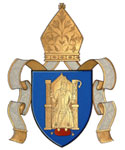 |
 |
News
Bishop's Address to Diocesan Synod 2012 part 1
Members of Synod, as you know the Diocesan Synod is more or less the AGM for the Diocese. It is a sort of turbo-charged Easter Vestry when, for the want of a better phrase, the "material well being" of the Diocese is discussed and accounted for.
In that way it will seem to some to be dry as dust; and to some extent so it should be. Our stewardship of our physical and financial resources is a very serious and sacred trust and we do well to remember that what we are doing here this evening is not simply for our good, but for the good of our children and grandchildren and for generations yet unborn.
Many States in the Western world are facing up to the fact that, for the first time in perhaps a century, the next generation will not be as well off as our generations have been. In our stewardship I hope we can do better. The whole financial system of the Western world has frequently been put in jeopardy because of short-sightedness; it is for us to take a longer view.
When I was considering what I might say this evening I thought I might have a look at some previous Synod addresses for inspiration. I went down to the strong room below this building and picked out a bound volume of old Diocesan Synod Minutes at random. I opened the first page and looked. The year was 1887 and the Bishop was Charles Maurice Stack, who JB Leslie's succession list describes as "of the Evangelical School, yet in many respects a strong Churchman and resolutely opposed to the revision of the Prayer Bookhe was [also] a strong supporter of the Spanish Reformed Episcopal Church" assisting in the consecration of its first Bishop.
Oddly enough I also have a connection with the Spanish Reformed Episcopal Church and will be meeting its current Bishop in a week or two. You may remember that Bishop Carlos visited Clogher a few years ago and he always speaks of his trip and of the people of Clogher with great affection. Like Bishop Stack I too am happy enough with The Prayer Book as it stands, but unlike him I was not born in the parish of Tubrid. But Canon Armstrong was, so who knows?
I read on in the first few pages of the Minutes and you will never guess what the two main items on the agenda turned out to be. The first was the Financial Scheme and the second was a vote of congratulations to Queen Victoria on her Golden Jubilee. As my daughter would say "Spooky or what?"
We will have an opportunity to discuss and vote on the Finance Scheme a little later, as we seek to smooth out the inevitable bumps in a what was a new initiative, for the long term benefit of the Diocese. I want only to add that the scheme has the support of the overwhelming majority of the Diocesan Council.
I would like to say a few words about the visit of Her Majesty the Queen and the Duke of Edinburgh. The first is just how joyful an occasion it turned out to be. The dean of Clogher, who was responsible for most of the organisation of the day aged by about 20 years in the process, but did so with tremendous energy. I know that he is still being contacted by people from all over the world saying how much they enjoyed the televised coverage. He will sell you a video for a pound.
Everywhere I go, I too am showered with very positive comments about the excellent organisation, the sincerity of the worship and the warmth of the occasion. And there is no doubt which part of the televised coverage has made the greatest impact; and that is the walk across the road by the clergy, Protestant and Roman Catholic, to St. Michael's Church.
That part of the day was only possible because Canon O'Reilly and his parishioners entered so wholeheartedly into the spirit of the occasion; and for that I wish to thank him and them equally wholeheartedly.
All in all it was a great day. As we were de-robing in the vestry after the event the Primate said to me that it was one of those occasions when one felt proud to be Church of Ireland. Well ordered liturgy, and very high quality music which was not so complicated that no one could sing it, and all delivered with sincerity and reverence and an open handed hospitality which is the mark of a generous spirit.
That spirit of mutual listening and respect was also in evidence in the Ulster Covenant event held recently in the Clinton Centre, which the Diocese and the Protestant Churches in Enniskillen organised in cooperation with the Fermanagh Grand Orange Lodge, and which was such a success. And I think that it is also significant that the Learning Together Project organised by the Fermanagh Trust is quietly and graciously helping to break down old barriers and to help promote good community relations.
Each of these events and initiatives is based on the understanding that we are proud of who we are and secure in our own traditions; and it is from this place of security that we can step out and listen respectfully to others and share our common life in so many ways.
As you know the Primate, The Most Revd Alan Harper is retiring at the end of this month, and this is a good time for me to pay tribute to his unwavering loyalty and dedication to his high calling. I have known Archbishop Alan since I was a curate in the Diocese of Connor and he was the Archdeacon of Connor. He is a man of complete integrity and conscientiousness who has had to lead the Church of Ireland through some very difficult territory, and has done so with great sensitivity and skill, and, I know, much prayer. We owe him a great deal and wish him and Helen well in retirement.
When I stood here to address you last year you probably did not know what to expect, and as I set out to get to know the Diocese I certainly did not know what to expect.
Life is full of surprises, although, like Bank Managers, Bishops would rather not have too many surprises. What I found to a large degree bore out my first anticipations- a widespread, busy Diocesan family of very varied character. There was the occasional family dispute going on here and there but by and large, in my first year, I can be very grateful for the welcome I have received.
Coming in from the outside I suppose there are some things that I notice which people brought up in Clogher would not. You may not think so, but in comparison to many other places in Ireland you have quite a high proportion of younger people (up to the age of eighteen anyway) in your Churches week by week. That is very encouraging to see and I would like to build on it.
One way of doing so is to involve young people as much as possible in the life of the parish and particularly in worship. It is for that reason that the Diocesan Council have approved a Music Bursary Scheme to encourage all people (but especially young people) to use their musical gifts in worship. Essentially the Scheme will assist with the cost of music tuition, and help to find suitable tuition, for those who will make a commitment to make a musical contribution in worship. It is an imaginative initiative by the Diocesan Council and I hope it will catch on.
I am always delighted and sometimes amazed at what I find going on in parish life. The recent celebration of mission work and trips which our parishes undertook last year to places as diverse as Kenya and Guatemala and which was held in the Cathedral here was a very moving and interesting evening. Parish life can be routine, but it should never be static.
Every parish in this diocese is sustained by the grace of God to do four things. They are there to worship God the Father, God the Son, and God the Holy Spirit. They are there to teach God's people and to draw them closer to His heart of love. They are there to serve the community in which they live- that is to serve in works of costly service. And they are there to promote mission so that the Name of Jesus Christ is known at home and overseas.
To worship, to teach, to serve and to engage in mission. Those are four headings against which any parish could make an assessment of how faithfully and fruitfully it is carrying out the tasks to which God has called it.
Is our worship of the highest quality we can achieve? Does it really engage and involve people from every generation in the parish? Does it reflect all the stages of salvation history that our Prayer Book caters for?
It is quite proper that each parish should ask itself the question "Are we teaching people the Faith as it has been received by the Church of Ireland". What adult focussed forms of teaching are we using? I have found that people are interested in deepening their knowledge, but sometimes afraid to say so in case they are thought stupid.
And also, how do we serve the community in which we are placed. What are the needs of those around us; especially the needs of the lonely and the poor and the sick and the outcast? How do we witness to this faith with Christian people from traditions other than our own.
And finally, how can so great a salvation be made known in word and deed to those who have no apparent interest in it in this country and abroad.
That is a big agenda, but it is what we are signed up to.
I want in conclusion to say a word about ministry in the Diocese. In terms of ordained ministry we have a number of new faces here today who were not here last year. The Revds Alan Irwin, Sampson Ajuka, and Caroline Mansley and very soon the Revd Brian Harper. We also welcome wholeheartedly Captain David Hamilton of the Church Army, and I for one am delighted to have a full time Church Army presence in the Diocese. They are not all very photogenic so I won't ask them to stand.
continued on part 2 of Bishop's Address to Diocesan Synod 2012.............
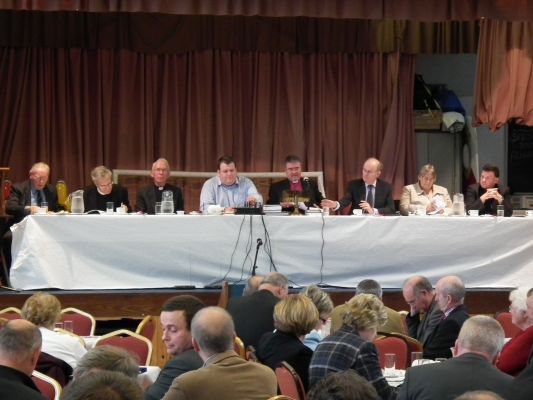
Diocesan Synod 2012
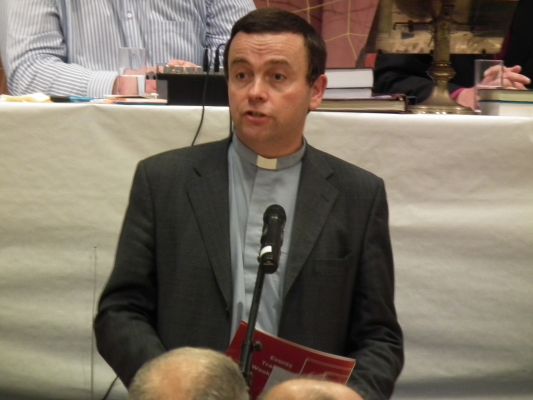
Revd Henry Blair
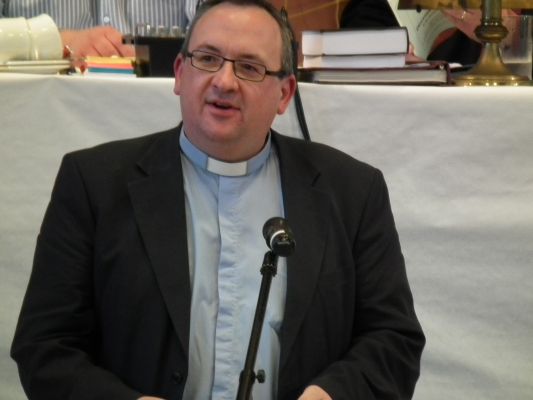
Revd Canon Ian Berry
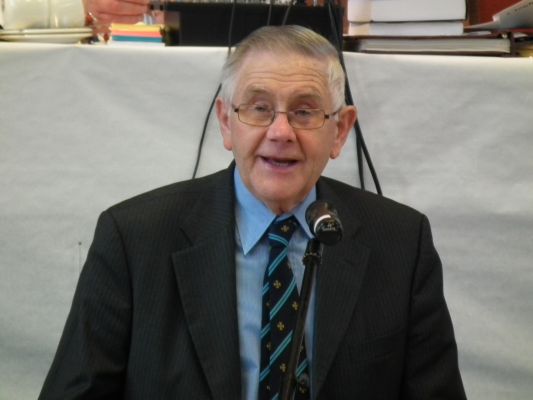
Mr Jim Kerr
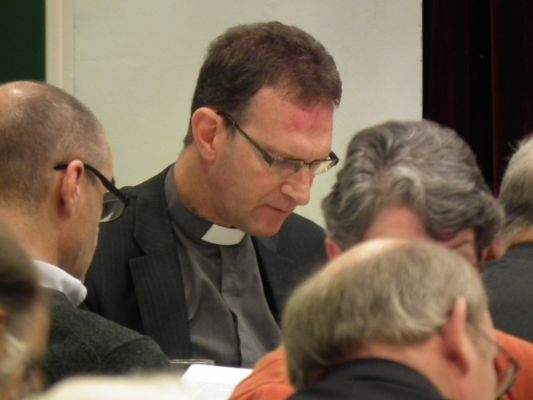
Very Revd Kenneth Hall
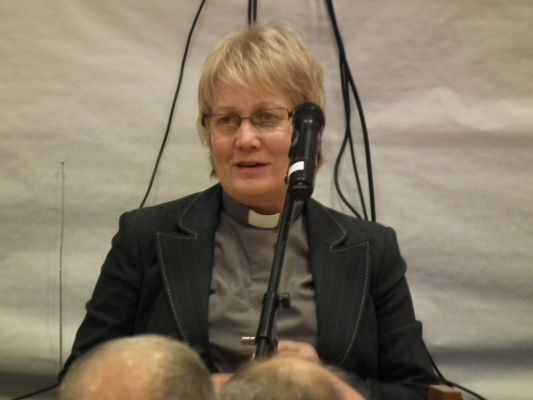
Revd Margaret Pringle
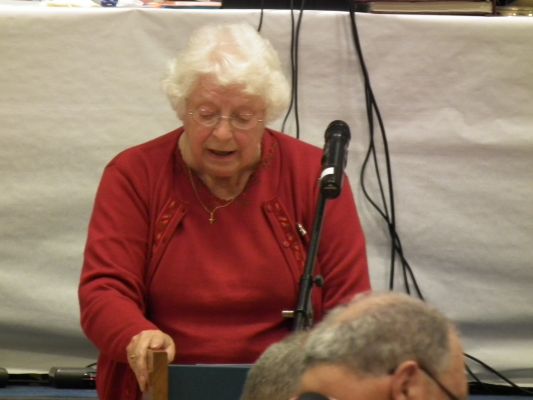
Miss Marie McCordick
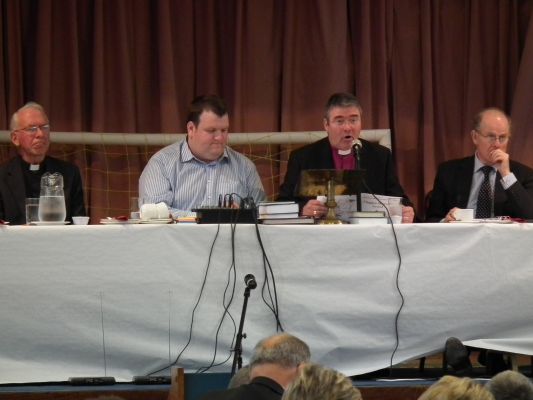
Diocesan Synod 2012
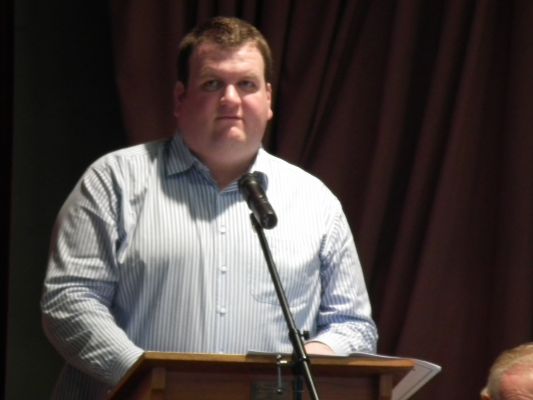
Mr Glenn Moore
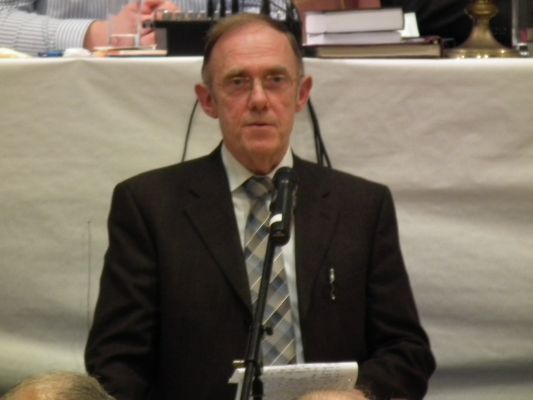
Mr Robert Forde